Gibbs Reflective Cycle: Developing Cultural Competence in Nursing Care
VerifiedAdded on 2023/06/13
|6
|1542
|289
Essay
AI Summary
This essay employs Gibbs' Reflective Cycle to critically analyze the development of cultural competence in nursing practice. It begins with a description of pre-coursework experiences, highlighting a culturally incompetent interaction with an aboriginal patient. The reflection then moves through feelings of satisfaction post-coursework, evaluation of the learning experience, and analysis of how the coursework improved cultural communication skills, particularly in rapport-building and non-verbal communication. The conclusion discusses alternative actions, such as completing the coursework before treating patients, and the action plan emphasizes the importance of acquiring knowledge and confidence before undertaking new activities. The essay underscores the value of Gibbs' cycle for reflective learning and professional development in nursing, ensuring culturally safe and respectful patient care. Desklib offers a wealth of similar essays and resources for students.
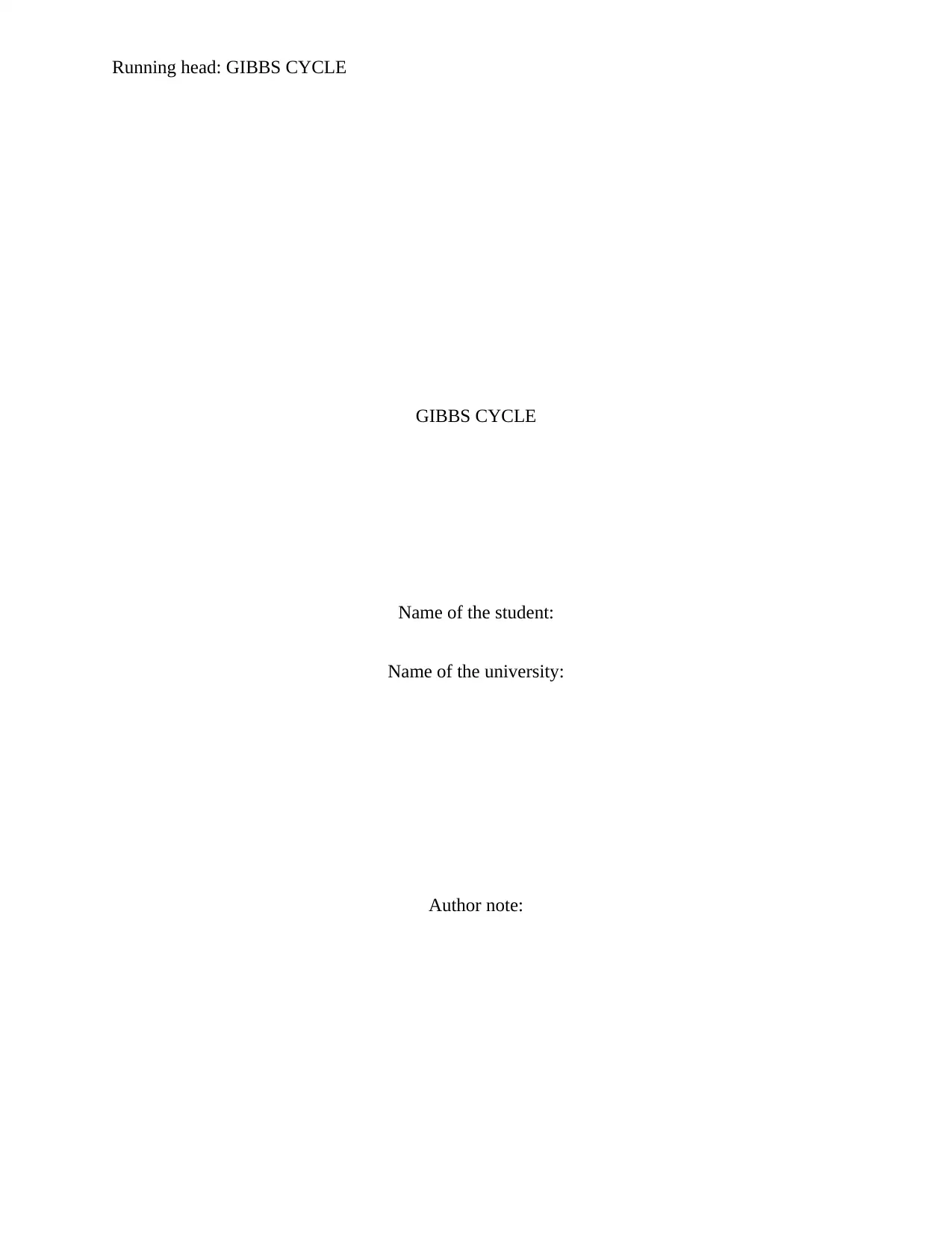
Running head: GIBBS CYCLE
GIBBS CYCLE
Name of the student:
Name of the university:
Author note:
GIBBS CYCLE
Name of the student:
Name of the university:
Author note:
Paraphrase This Document
Need a fresh take? Get an instant paraphrase of this document with our AI Paraphraser
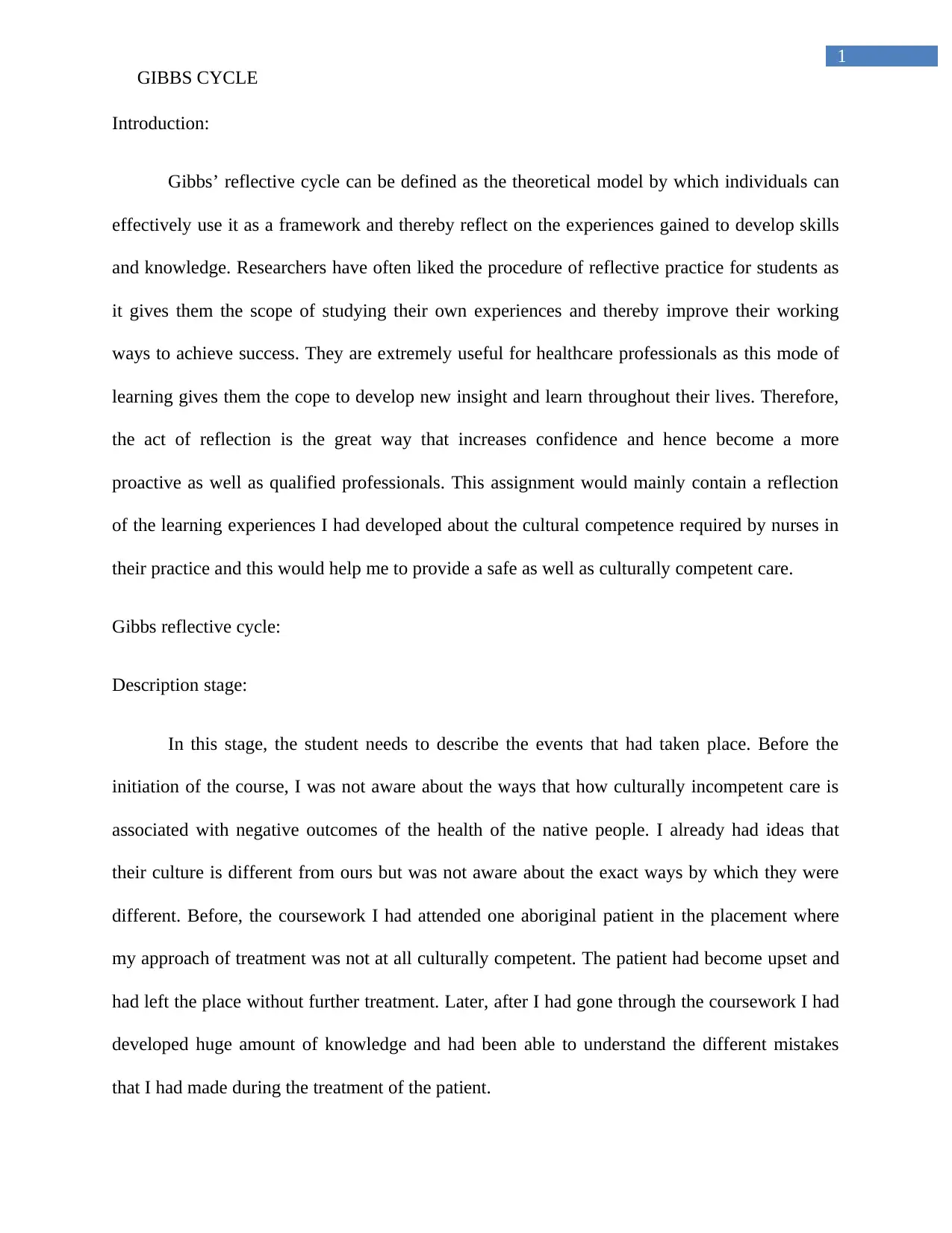
1
GIBBS CYCLE
Introduction:
Gibbs’ reflective cycle can be defined as the theoretical model by which individuals can
effectively use it as a framework and thereby reflect on the experiences gained to develop skills
and knowledge. Researchers have often liked the procedure of reflective practice for students as
it gives them the scope of studying their own experiences and thereby improve their working
ways to achieve success. They are extremely useful for healthcare professionals as this mode of
learning gives them the cope to develop new insight and learn throughout their lives. Therefore,
the act of reflection is the great way that increases confidence and hence become a more
proactive as well as qualified professionals. This assignment would mainly contain a reflection
of the learning experiences I had developed about the cultural competence required by nurses in
their practice and this would help me to provide a safe as well as culturally competent care.
Gibbs reflective cycle:
Description stage:
In this stage, the student needs to describe the events that had taken place. Before the
initiation of the course, I was not aware about the ways that how culturally incompetent care is
associated with negative outcomes of the health of the native people. I already had ideas that
their culture is different from ours but was not aware about the exact ways by which they were
different. Before, the coursework I had attended one aboriginal patient in the placement where
my approach of treatment was not at all culturally competent. The patient had become upset and
had left the place without further treatment. Later, after I had gone through the coursework I had
developed huge amount of knowledge and had been able to understand the different mistakes
that I had made during the treatment of the patient.
GIBBS CYCLE
Introduction:
Gibbs’ reflective cycle can be defined as the theoretical model by which individuals can
effectively use it as a framework and thereby reflect on the experiences gained to develop skills
and knowledge. Researchers have often liked the procedure of reflective practice for students as
it gives them the scope of studying their own experiences and thereby improve their working
ways to achieve success. They are extremely useful for healthcare professionals as this mode of
learning gives them the cope to develop new insight and learn throughout their lives. Therefore,
the act of reflection is the great way that increases confidence and hence become a more
proactive as well as qualified professionals. This assignment would mainly contain a reflection
of the learning experiences I had developed about the cultural competence required by nurses in
their practice and this would help me to provide a safe as well as culturally competent care.
Gibbs reflective cycle:
Description stage:
In this stage, the student needs to describe the events that had taken place. Before the
initiation of the course, I was not aware about the ways that how culturally incompetent care is
associated with negative outcomes of the health of the native people. I already had ideas that
their culture is different from ours but was not aware about the exact ways by which they were
different. Before, the coursework I had attended one aboriginal patient in the placement where
my approach of treatment was not at all culturally competent. The patient had become upset and
had left the place without further treatment. Later, after I had gone through the coursework I had
developed huge amount of knowledge and had been able to understand the different mistakes
that I had made during the treatment of the patient.
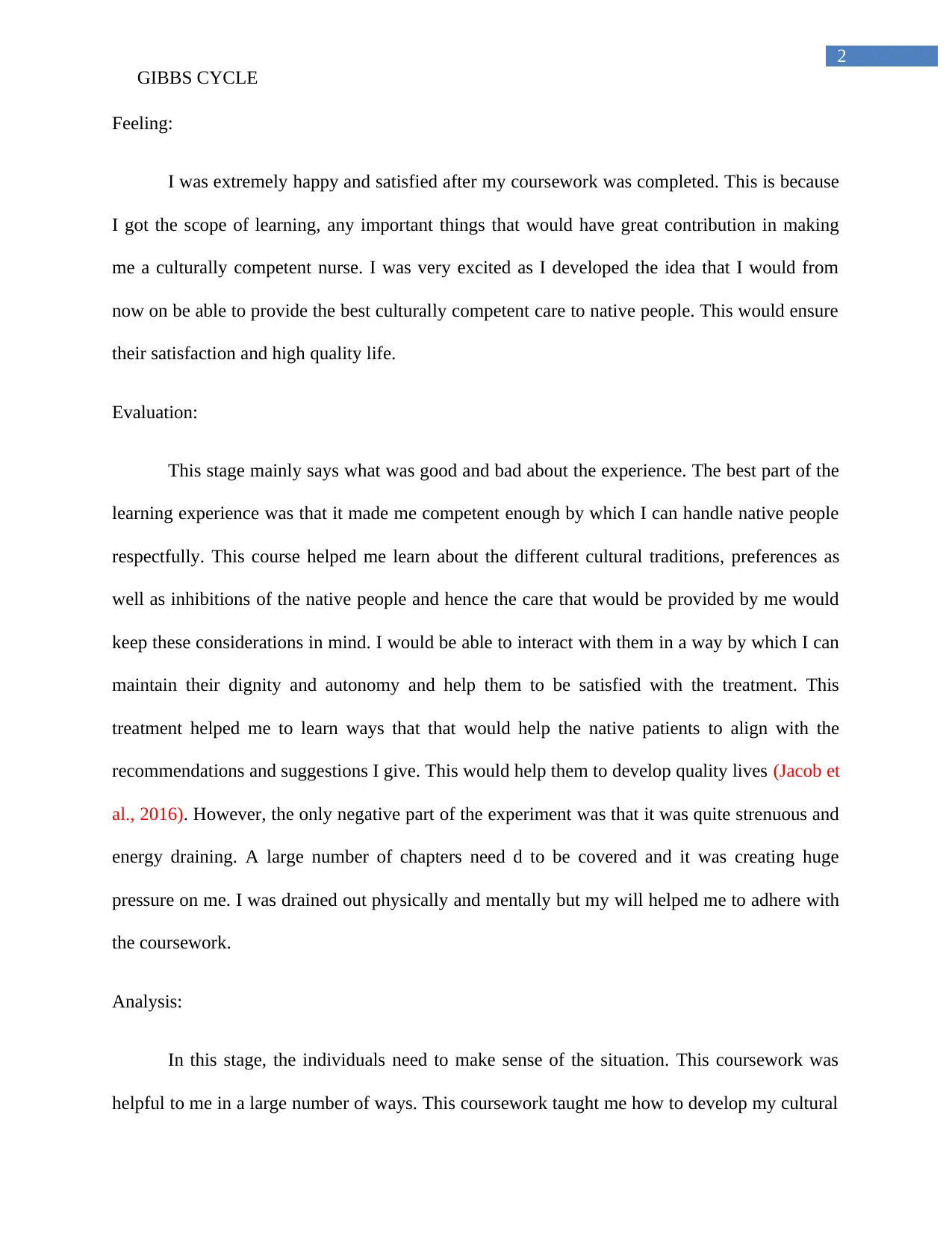
2
GIBBS CYCLE
Feeling:
I was extremely happy and satisfied after my coursework was completed. This is because
I got the scope of learning, any important things that would have great contribution in making
me a culturally competent nurse. I was very excited as I developed the idea that I would from
now on be able to provide the best culturally competent care to native people. This would ensure
their satisfaction and high quality life.
Evaluation:
This stage mainly says what was good and bad about the experience. The best part of the
learning experience was that it made me competent enough by which I can handle native people
respectfully. This course helped me learn about the different cultural traditions, preferences as
well as inhibitions of the native people and hence the care that would be provided by me would
keep these considerations in mind. I would be able to interact with them in a way by which I can
maintain their dignity and autonomy and help them to be satisfied with the treatment. This
treatment helped me to learn ways that that would help the native patients to align with the
recommendations and suggestions I give. This would help them to develop quality lives (Jacob et
al., 2016). However, the only negative part of the experiment was that it was quite strenuous and
energy draining. A large number of chapters need d to be covered and it was creating huge
pressure on me. I was drained out physically and mentally but my will helped me to adhere with
the coursework.
Analysis:
In this stage, the individuals need to make sense of the situation. This coursework was
helpful to me in a large number of ways. This coursework taught me how to develop my cultural
GIBBS CYCLE
Feeling:
I was extremely happy and satisfied after my coursework was completed. This is because
I got the scope of learning, any important things that would have great contribution in making
me a culturally competent nurse. I was very excited as I developed the idea that I would from
now on be able to provide the best culturally competent care to native people. This would ensure
their satisfaction and high quality life.
Evaluation:
This stage mainly says what was good and bad about the experience. The best part of the
learning experience was that it made me competent enough by which I can handle native people
respectfully. This course helped me learn about the different cultural traditions, preferences as
well as inhibitions of the native people and hence the care that would be provided by me would
keep these considerations in mind. I would be able to interact with them in a way by which I can
maintain their dignity and autonomy and help them to be satisfied with the treatment. This
treatment helped me to learn ways that that would help the native patients to align with the
recommendations and suggestions I give. This would help them to develop quality lives (Jacob et
al., 2016). However, the only negative part of the experiment was that it was quite strenuous and
energy draining. A large number of chapters need d to be covered and it was creating huge
pressure on me. I was drained out physically and mentally but my will helped me to adhere with
the coursework.
Analysis:
In this stage, the individuals need to make sense of the situation. This coursework was
helpful to me in a large number of ways. This coursework taught me how to develop my cultural
⊘ This is a preview!⊘
Do you want full access?
Subscribe today to unlock all pages.

Trusted by 1+ million students worldwide
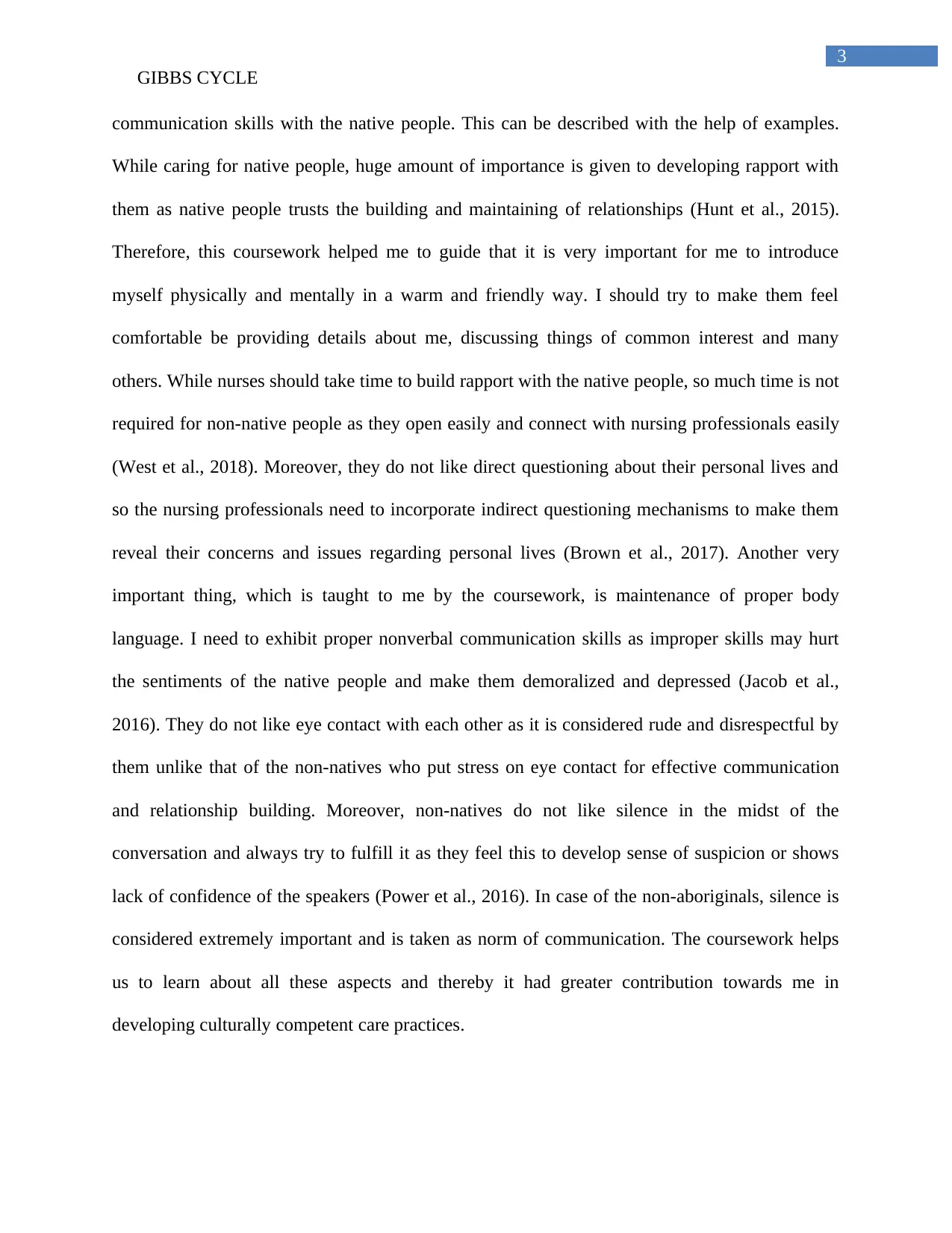
3
GIBBS CYCLE
communication skills with the native people. This can be described with the help of examples.
While caring for native people, huge amount of importance is given to developing rapport with
them as native people trusts the building and maintaining of relationships (Hunt et al., 2015).
Therefore, this coursework helped me to guide that it is very important for me to introduce
myself physically and mentally in a warm and friendly way. I should try to make them feel
comfortable be providing details about me, discussing things of common interest and many
others. While nurses should take time to build rapport with the native people, so much time is not
required for non-native people as they open easily and connect with nursing professionals easily
(West et al., 2018). Moreover, they do not like direct questioning about their personal lives and
so the nursing professionals need to incorporate indirect questioning mechanisms to make them
reveal their concerns and issues regarding personal lives (Brown et al., 2017). Another very
important thing, which is taught to me by the coursework, is maintenance of proper body
language. I need to exhibit proper nonverbal communication skills as improper skills may hurt
the sentiments of the native people and make them demoralized and depressed (Jacob et al.,
2016). They do not like eye contact with each other as it is considered rude and disrespectful by
them unlike that of the non-natives who put stress on eye contact for effective communication
and relationship building. Moreover, non-natives do not like silence in the midst of the
conversation and always try to fulfill it as they feel this to develop sense of suspicion or shows
lack of confidence of the speakers (Power et al., 2016). In case of the non-aboriginals, silence is
considered extremely important and is taken as norm of communication. The coursework helps
us to learn about all these aspects and thereby it had greater contribution towards me in
developing culturally competent care practices.
GIBBS CYCLE
communication skills with the native people. This can be described with the help of examples.
While caring for native people, huge amount of importance is given to developing rapport with
them as native people trusts the building and maintaining of relationships (Hunt et al., 2015).
Therefore, this coursework helped me to guide that it is very important for me to introduce
myself physically and mentally in a warm and friendly way. I should try to make them feel
comfortable be providing details about me, discussing things of common interest and many
others. While nurses should take time to build rapport with the native people, so much time is not
required for non-native people as they open easily and connect with nursing professionals easily
(West et al., 2018). Moreover, they do not like direct questioning about their personal lives and
so the nursing professionals need to incorporate indirect questioning mechanisms to make them
reveal their concerns and issues regarding personal lives (Brown et al., 2017). Another very
important thing, which is taught to me by the coursework, is maintenance of proper body
language. I need to exhibit proper nonverbal communication skills as improper skills may hurt
the sentiments of the native people and make them demoralized and depressed (Jacob et al.,
2016). They do not like eye contact with each other as it is considered rude and disrespectful by
them unlike that of the non-natives who put stress on eye contact for effective communication
and relationship building. Moreover, non-natives do not like silence in the midst of the
conversation and always try to fulfill it as they feel this to develop sense of suspicion or shows
lack of confidence of the speakers (Power et al., 2016). In case of the non-aboriginals, silence is
considered extremely important and is taken as norm of communication. The coursework helps
us to learn about all these aspects and thereby it had greater contribution towards me in
developing culturally competent care practices.
Paraphrase This Document
Need a fresh take? Get an instant paraphrase of this document with our AI Paraphraser
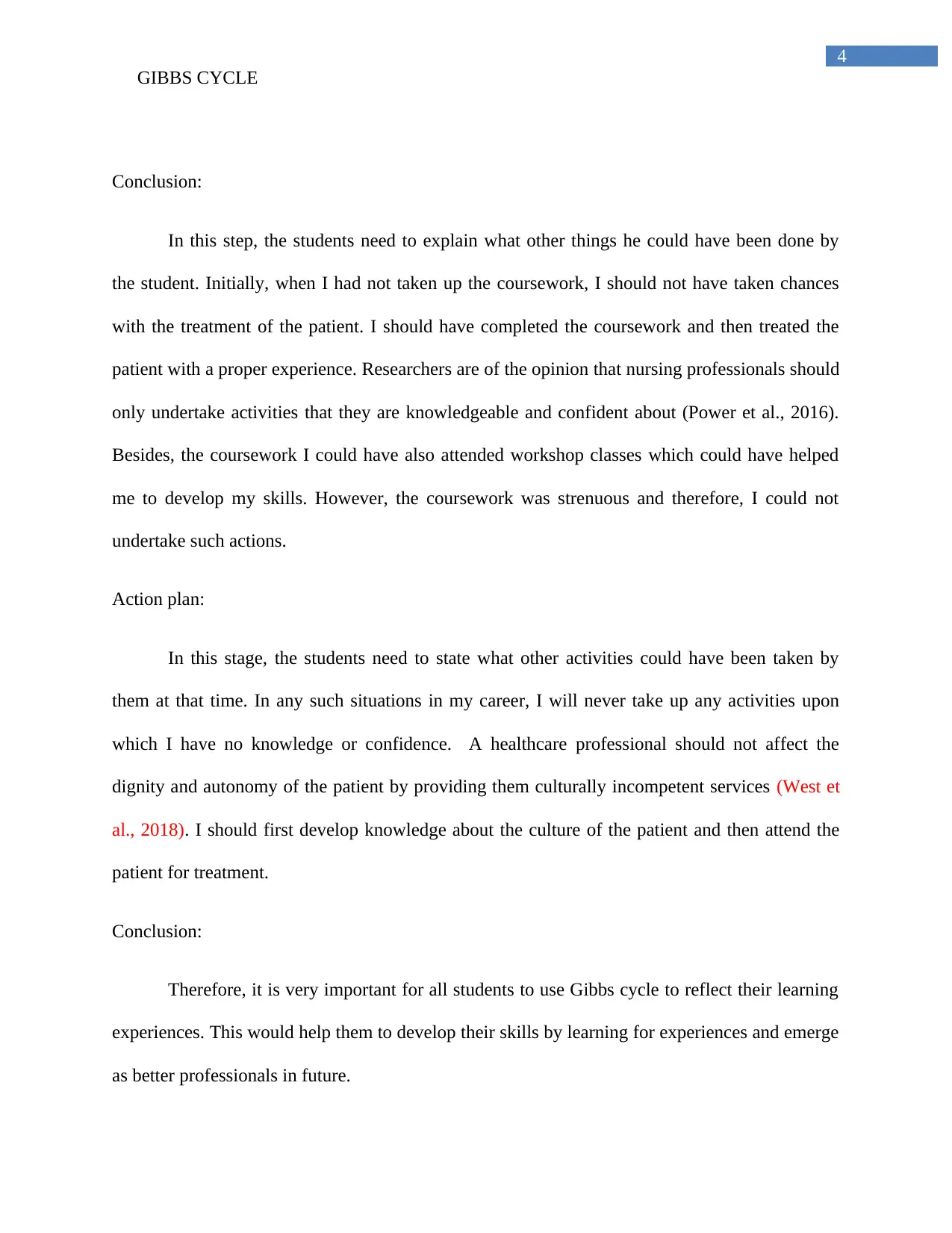
4
GIBBS CYCLE
Conclusion:
In this step, the students need to explain what other things he could have been done by
the student. Initially, when I had not taken up the coursework, I should not have taken chances
with the treatment of the patient. I should have completed the coursework and then treated the
patient with a proper experience. Researchers are of the opinion that nursing professionals should
only undertake activities that they are knowledgeable and confident about (Power et al., 2016).
Besides, the coursework I could have also attended workshop classes which could have helped
me to develop my skills. However, the coursework was strenuous and therefore, I could not
undertake such actions.
Action plan:
In this stage, the students need to state what other activities could have been taken by
them at that time. In any such situations in my career, I will never take up any activities upon
which I have no knowledge or confidence. A healthcare professional should not affect the
dignity and autonomy of the patient by providing them culturally incompetent services (West et
al., 2018). I should first develop knowledge about the culture of the patient and then attend the
patient for treatment.
Conclusion:
Therefore, it is very important for all students to use Gibbs cycle to reflect their learning
experiences. This would help them to develop their skills by learning for experiences and emerge
as better professionals in future.
GIBBS CYCLE
Conclusion:
In this step, the students need to explain what other things he could have been done by
the student. Initially, when I had not taken up the coursework, I should not have taken chances
with the treatment of the patient. I should have completed the coursework and then treated the
patient with a proper experience. Researchers are of the opinion that nursing professionals should
only undertake activities that they are knowledgeable and confident about (Power et al., 2016).
Besides, the coursework I could have also attended workshop classes which could have helped
me to develop my skills. However, the coursework was strenuous and therefore, I could not
undertake such actions.
Action plan:
In this stage, the students need to state what other activities could have been taken by
them at that time. In any such situations in my career, I will never take up any activities upon
which I have no knowledge or confidence. A healthcare professional should not affect the
dignity and autonomy of the patient by providing them culturally incompetent services (West et
al., 2018). I should first develop knowledge about the culture of the patient and then attend the
patient for treatment.
Conclusion:
Therefore, it is very important for all students to use Gibbs cycle to reflect their learning
experiences. This would help them to develop their skills by learning for experiences and emerge
as better professionals in future.
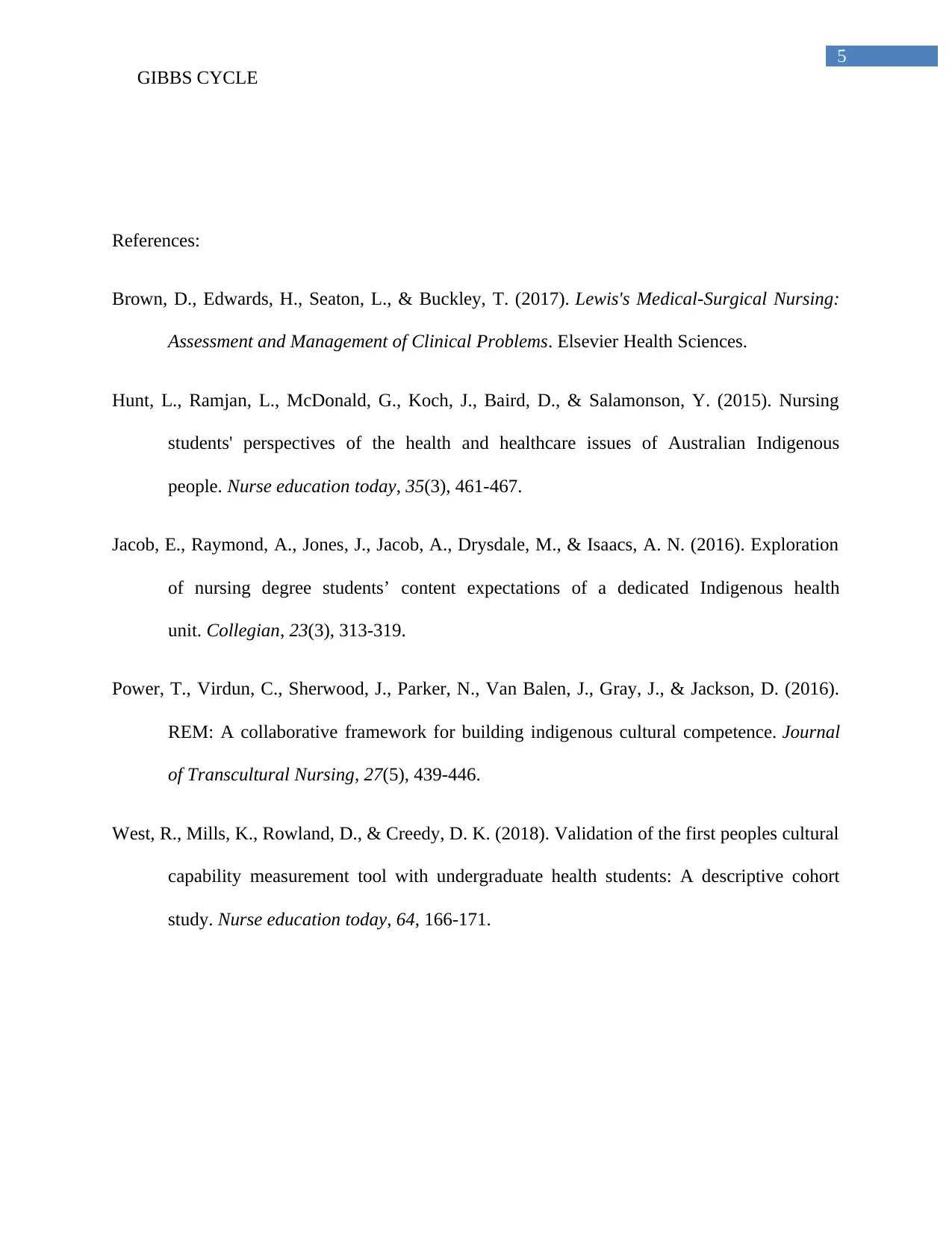
5
GIBBS CYCLE
References:
Brown, D., Edwards, H., Seaton, L., & Buckley, T. (2017). Lewis's Medical-Surgical Nursing:
Assessment and Management of Clinical Problems. Elsevier Health Sciences.
Hunt, L., Ramjan, L., McDonald, G., Koch, J., Baird, D., & Salamonson, Y. (2015). Nursing
students' perspectives of the health and healthcare issues of Australian Indigenous
people. Nurse education today, 35(3), 461-467.
Jacob, E., Raymond, A., Jones, J., Jacob, A., Drysdale, M., & Isaacs, A. N. (2016). Exploration
of nursing degree students’ content expectations of a dedicated Indigenous health
unit. Collegian, 23(3), 313-319.
Power, T., Virdun, C., Sherwood, J., Parker, N., Van Balen, J., Gray, J., & Jackson, D. (2016).
REM: A collaborative framework for building indigenous cultural competence. Journal
of Transcultural Nursing, 27(5), 439-446.
West, R., Mills, K., Rowland, D., & Creedy, D. K. (2018). Validation of the first peoples cultural
capability measurement tool with undergraduate health students: A descriptive cohort
study. Nurse education today, 64, 166-171.
GIBBS CYCLE
References:
Brown, D., Edwards, H., Seaton, L., & Buckley, T. (2017). Lewis's Medical-Surgical Nursing:
Assessment and Management of Clinical Problems. Elsevier Health Sciences.
Hunt, L., Ramjan, L., McDonald, G., Koch, J., Baird, D., & Salamonson, Y. (2015). Nursing
students' perspectives of the health and healthcare issues of Australian Indigenous
people. Nurse education today, 35(3), 461-467.
Jacob, E., Raymond, A., Jones, J., Jacob, A., Drysdale, M., & Isaacs, A. N. (2016). Exploration
of nursing degree students’ content expectations of a dedicated Indigenous health
unit. Collegian, 23(3), 313-319.
Power, T., Virdun, C., Sherwood, J., Parker, N., Van Balen, J., Gray, J., & Jackson, D. (2016).
REM: A collaborative framework for building indigenous cultural competence. Journal
of Transcultural Nursing, 27(5), 439-446.
West, R., Mills, K., Rowland, D., & Creedy, D. K. (2018). Validation of the first peoples cultural
capability measurement tool with undergraduate health students: A descriptive cohort
study. Nurse education today, 64, 166-171.
⊘ This is a preview!⊘
Do you want full access?
Subscribe today to unlock all pages.

Trusted by 1+ million students worldwide
1 out of 6
Related Documents
Your All-in-One AI-Powered Toolkit for Academic Success.
+13062052269
info@desklib.com
Available 24*7 on WhatsApp / Email
![[object Object]](/_next/static/media/star-bottom.7253800d.svg)
Unlock your academic potential
Copyright © 2020–2026 A2Z Services. All Rights Reserved. Developed and managed by ZUCOL.





